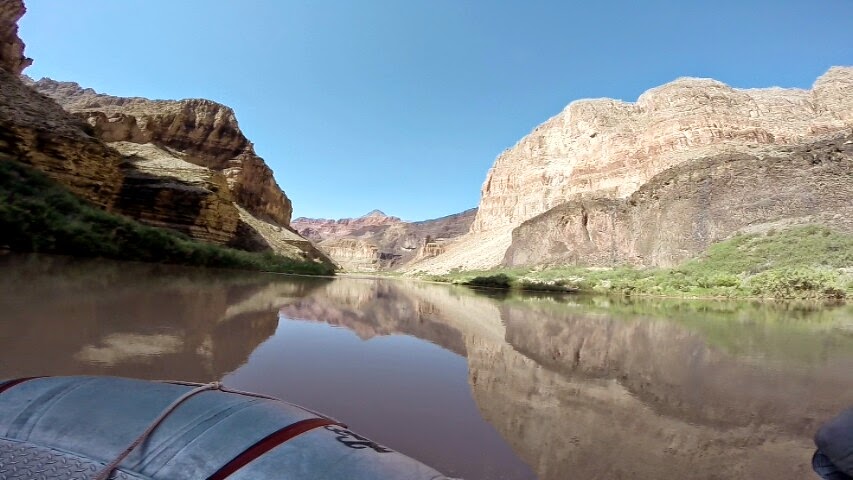He recorded
most of his instrumentals right in the depths of the Canyon during his
fourth raft trip in 1985 (and the rest in the Cathedral of St. John the Divine
in New York). His album’s liner notes use words of John Wesley Powell to explain his inspiration:
“The wonders of the Grand Canyon cannot be adequately represented in
symbols of speech nor by speech itself… It is the land of music… a land of
song. Mountains of music swell in the rivers, hills of music billow in the
creeks, and meadows of music murmur in the rills that ripple over the rocks…
All this is the music of waters.”
No art form
– not the world’s greatest photographs nor the greatest paintings – come close
to recreating the full esthetic, the powerful, soul-stirring experience of
being immersed in the Grand Canyon. For me, the haunting music of Paul Winter’s
“Canyon” comes closest.
That’s what
I was listening to through my ear buds when my tears flowed. The first notes of “Canyon”
from a desert drum emit a buzzing snare so primitive and dark and low that you
might think something is wrong with your speakers. Hearing those sounds
rumbling in the Canyon itself, I was overwhelmed. Those
opening, aboriginal chords resonate with the very core of the Grand Canyon – a black,
ominous rock of ocean muds beyond ancient, the Vishnu schist.
“A float down
the Colorado through the Grand Canyon is a stark descent through light and
density and time. From the soft sandstone and flamingo limestones of the Kaibab
Plateau, exposed at river level Lees Ferry, the Colorado cuts through rock that
progressively ages, hardens and darkens. It plunges through the eons and the
strata, through shales, conglomerates, and basalts, residues of primordial seas
and cataclysmic eruptions and upheavals. Until, at last, in the Inner Gorge, in
the deepest corridor of the canyon, the river washes against the oldest,
blackest, and hardest rock of all: Vishnu schist. Dark as Dante’s Inferno, almost
2 billion years old, the rock is a relic of a time when the earth’s molten
center disturbed its surface, imposing unfathomable heat and presses that
recrystallized sediments into new minerals. So dark it seems to swallow light,
Vishnu schist is named for the Hindu deity worshiped as the protector, a
syncretic personality composed of many lesser cult figures and associated with
the sun.” –Former Boatman Richard Bangs, “Time Bandits” (in The Gift of Rivers, 2000)
How can
anyone see such things and hear such music and not be touched in their soul? Mornings,
we awoke to trills of canyon wrens, their songs complementing the ceaseless,
tumbling, orchestral river. Days on the water were filled with long minutes of
silence, soaking in the exquisite, ever-changing beauty, then punctuated by laughter
and screams of sheer exhilaration while crashing through rapids – more than 150
in all.Evenings, we watched the shadow of sunset creep up cliffs, meeting the flaming rock layers of reds, yellows, and ochers. Such sunsets have happened every night for several million years – for that’s how long it’s taken the Canyon’s forces to incise the river through a mile of rocks – the scene ever changing, never exactly the same. Yet, until the last blink of an eye in geologic time, no human ever saw one of those sunsets. No human ear ever heard the Canyon’s music. Was it still as beautiful?
It was that great beauty of it all – the landscape and river, the company of old friends and new, the music of “Canyon” in my head – that overpowered me, leaving me speechless and so very, very grateful to be alive. That’s why I was crying like a baby in the middle of the day while floating in sunshine down the Colorado River in the bottom of the Grand Canyon. I don’t think anyone even noticed.
Back to Introduction



No comments:
Post a Comment